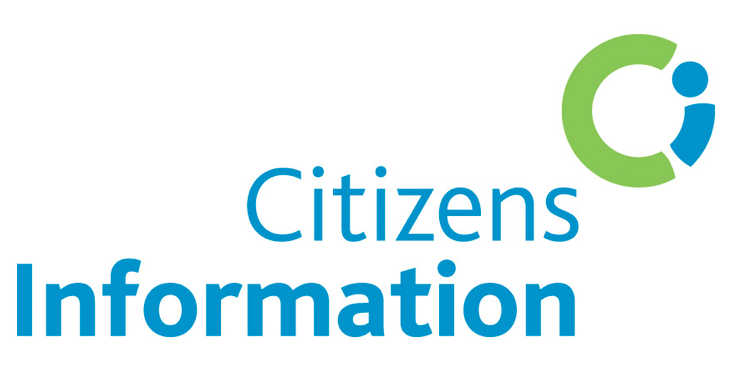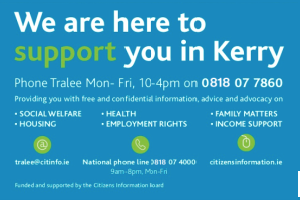 Know Your Rights has been compiled by Citizens Information Kerry which provides a free and confidential service to the public…
Know Your Rights has been compiled by Citizens Information Kerry which provides a free and confidential service to the public…
Anyone planning to get married in Ireland must give a minimum of 3 months’ notice to the Registrar at a Civil Registration Service.
This is the law in Ireland and it applies to all civil, religious and secular marriages. This is sometimes referred to as notification of your intention to marry.
If everything is in order, the Registrar will give you a Marriage Registration Form (MRF). The MRF is like a marriage licence. It gives you authorisation or permission to get married.
Continued below…
How do I give notice of my intention to marry?
You will need to do the following:
• Contact your local Civil Registration Service to get a postal marriage notification form. Once you have completed the form, you can return it by post or by email.
• Contact the Civil Registration Service to make a marriage notification appointment with the Registrar. You can also book a marriage notification appointment online for certain areas of the country.
• When you make the appointment with the Registrar, you will be told what information and documents to bring with you.
The requirement to give 3 months’ notice does not apply to civil partners whose civil partnership was registered in Ireland.
What documents will I need to bring?
Generally, you and your intended spouse will each need to bring the original (or certified copy) and a colour photocopy of your:
• Passport as identification
• Birth certificate
• Final divorce decrees in respect of all previous divorces if divorced
• Dissolution decrees in respect of all previous civil partnerships if you have a civil partnership dissolution
• Final decree of nullity and a letter from the relevant court confirming that no appeal was lodged, if you were in a civil partnership or marriage that was annulled by an Irish court
• Deceased spouse’s death certificate and your civil marriage certificate if either of you is widowed
• Deceased civil partner’s death certificate and your civil partnership certificate if either of you is widowed
• Documentary evidence of immigration status if not a citizen of Ireland or an EU member state
Continued below…
If either of you is not an Irish citizen, you may be asked to provide a Letter or Certificate of Freedom to Marry or other documentary confirmation of your civil status from your country of origin.
You will also have to provide information about the intended marriage, such as:
• Whether it will be a civil, secular or religious ceremony
• The intended date and location of the marriage
• Details of the proposed solemniser of the marriage
• The names and dates of birth of the two proposed witnesses
• A PPS number is required for all parties serving notice of intention to marry, who have or will have a current or a future address within the State
You will need to download and complete the Data Capture Form, which is available on-line. You should bring the completed form with you to the appointment.
Is there a charge?
You will have to pay a notification fee. The non-refundable notification fee is €200. There is a reduced notification fee of €50 for same-sex couples who are already in a civil partnership that is registered in Ireland and now wish to marry.
What happens at the marriage notification appointment?
When you and your intended spouse meet the Registrar at the Civil Registration Service office, you will be required to sign, in the Registrar’s presence, a declaration that you are free to marry and know of no lawful impediment to your proposed marriage.
The Registrar will issue an acknowledgement to both of you and the proposed solemniser of the marriage confirming the date of receipt of notification. This does not give you permission to marry. You will also have to pay the notification fee of €200.
If all the information required has been supplied and there is no impediment to the marriage, the Registrar will issue you with a Marriage Registration Form. This is an important document. You will need this to get married and to be able to register your marriage.
If you, your intended spouse, the witnesses or the solemniser has a limited knowledge of English, you must provide an interpreter. The interpreter must be from an independent, verifiable translation company and be present for both the notification of intention to marry and the marriage itself.
What is the Marriage Notification Form?
Couples require a Marriage Registration Form (MRF) to get married in Ireland. It is like a marriage licence as it gives authorisation for a couple to marry.
As long as there is no impediment (barrier) to the marriage, the Registrar will give you an MRF.
You must then give the MRF to the person who will be solemnising your marriage. The MRF is also needed to register your marriage after you get married.
If you bring all the required documentation to your marriage notification appointment with the Registrar, the Registrar may be able to issue the MRF immediately.
If the marriage does not take place within 6 months of the date of marriage given on the MRF, a new MRF will be required if you still intend to marry. You will need to repeat the notification process.
• During COVID-19, you can find comprehensive integrated information online at citizensinformation.ie/covid19/ and you can get daily updates on what’s changed on Twitter at @citizensinfo. You can also get information and advice from:
Tralee on Tel: Call 0818 07 7860, Monday – Friday (10am-4pm)
The Citizens Information Phone Service: Call 0818 07 4000, Monday to Friday, 9am – 8pm
Our national call back service: Visit citizensinformation.ie/callback to request a phone call from an information officer














